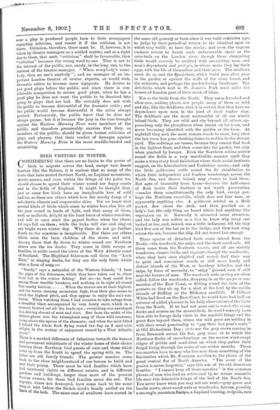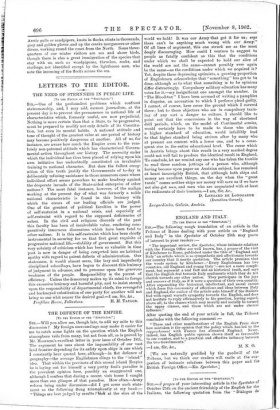BIRD VISITORS IN WINTER.
CONSIDERING that there are no limits to the power of birds to migrate across the land, except vast desert barriers like the Sahara, it is curious that so many of the boats that have nested furthest North, on Lapland mountains, Arctic mosses, and even within the fringe of the polar ice, should choose to spend their winter round our foggy coasts and in the fields of England. It might be thought that, just as some few birds have an inexplicable love of cold and ice, so there are others which love the murky damp of a sub-Arctic climate and crepuscular skies. Yet we know that several kinds of birds which come to winter here also live all the year round in lands of light, and that many of them, such as mallards, delight in the least burst of winter sunshine, and will at once start the gayest frolics when the cheer- ful rays fall on them ; while the larks will rise and sing on any bright warm winter day. Why these do not go further South to the sunshine is inexplicable. But there are others which seem the born children of the storm and mist. Among those that fly down to winter round our Northern shores are the ice ducks. They come in little coveys or families, to settle round the islets of the West Atlantic coast of Scotland. The Highland fishermen call them the "Loch Binn," or singing ducks, for they are the only birds which utter a form of song:—
" Surely," says a naturalist of the Western Islands, "I hear the pipes of the fishermen, which they have taken out to cheer their toil in the winter fishing! But no—no boat could live among those terrible breakers, and nothing is in sight all round that murky horizon ..... . When the storms are at their highest, and the waves running mountains high, then their glee seems to reach the highest pitch, and they appear to enjoy the sea's con- fusion. When watching them I had occasion to take refuge from a dreadful blast, accompanied by very heavy snow, which in a moment blotted out all the landscape ; everything was enveloped in a driving shroud of mist and sleet. But from the midst of the intense gloom rose the triumphant song of these wild creatures, rising above the uproar of the elements ; and when the mist lifted I beheld the whole flock flying round the bay as if mad with delight, in the ecstasy of enjoyment caused by a West Atlantic storm."
There is a marked difference of behaviour towards the human and permanent inhabitants of the winter home of tbeir choice talween these Northern bird guests of ours and. those which
• unie up from the South to spend the spring with us. The latter are old family friends. The greater number come back to the close neighbourhood of our houses to build and _reaar their young. There must be bird families which have bad territorial rights on different estates, and in different gardens and buildings, longer than most of the present human owners, for these bird families never die out. The °I3playa..where not destroyed, have come back to the same crag islet before the Scotch laird's family settled on the
the loch.. The same race of swallows have nested in
the same old granary or barn since it was built centuries ago, to judge by their periodical return to the identical spot on which they build ; so have the storks ; and even the vagrom cuckoos return to haunt such unfavourable spots as the osier-beds on the London river, though these changeling birds would scarcely be credited with associating nuns, and man's dependants and protgs, in whose nests they lay their eggs, with the life of themselves and their race. The swallows must do so, and the flycatchers, which build year after year in the garden or against the walls of the same house, and the redstarts, and perhaps the garden-loving blackcaps. The dabchicks which nest in St. James's Park must make the houses of London part of their stock of ideas.
Not so the birds from the North. They are a detached and alien race, seeking places, not people, ninny of them so wild and shy, like the fieldfares, that it is certain that they have no dependence upon man in the land of their winter stay. The fieldfares are the most mistrustful of all our winter inland birds. They are wild and shy beyond all others, ap- proaching only the ploughman when intent on his team, and never becoming identified with the garden or the farm. At nightfall they seek the most remote woods to roost, long after the last team has gone clanking home to stables in the distant yard. The redwings are tamer, because they cannot find food in the lightest frost, and then come into the garden, but only when pinched by hunger. Even the Northern robins scatter round the fields in a very unrobinlike manner until they make a temporary local habitation where their social instincts suggest, on the Lincolnshire and Yorkshire coasts ; and only the little goldcrests settle round the fir shrubberies to which their independent and fearless wanderings across the North Sea, and thence inland, may chance to lead them. But ages of immunity from harm—because the half-ounce of flesh inside their feathers is not worth persecuting —render them constitutionally the only bird, except per- haps the Northern crossbills, which does not fear man, or apparently anything else. A goldcrest settled on a Hull packet, flew about the deck, and then perched on a lady's hat, the only thing on board which had anything like vegetation on it. Naturally it attracted some attention, and the lady was rather at a loss to know why every one looked at her, and, indeed, was a little indignant, till the tiny bird flew out of the hat on to the bridge, and then took wing across the sea, because the ship did not travel fast enough.
Three species of detached birds come inland from the North,—the woodcock, the snipe, and the short-eared owls. All three come from the Northern wastes, and all are strictly wanderers, chance birds i and vagrants, though the woodcocks, when they have once alighted and rested, find their way to quiet and convenient woods, or still more lonely and distant islands of the West, or heathery hillsides, and the snipe, by force of necessity, to " snipy " ground, even if still near the haunts of man. The woodcock owls, as they are often called, follow the woodcocks, dropping in on the quays or sea- marshes of the East Coast, or flitting round the lairs of the gunners as they sit up for a shot at the fowl by the cockle strands of Stiff key or the Blakeney sandhills. If Gilbert White had lived on the East Coast, he would have had half an autumn of added pleasure in his daily observations of the birds from the North. If he had not gone out to watch the scaup ducks and scoters on the mussel-beds, he would scarcely have been able to forego daily visits to the sandhill fringe and the great flats beyond them, where the wild geese are settling in with their usual punctuality to "pay their last year's rents" at Old Michaelmas Day ; or to see the grey crows coming in from Denmark across the flat, grey seas ; or to watch the Northern flocks of snow-buntings on the narrow wind-swept ridges of pebble and sand-dune on which they gather their frugal living through the series of our winter months. These sea-marshes have to men who live near them something of the fascination which Mr. Fountain ascribes to the plains of the great central flat of North America. "The scent of the prairie is never forgotten," says this son of the old American frontier. "I cannot keep off those marshes" is the common phrase of men who lead an active and by no means romantic life near this delectable fringe of the bed of the North Sea. You never know what you may not see next,—grey geese and hoodie crows, short-eared owls or woodcocks, falcons, possibly a sea-eagle, mountain finekes, a Lapland bunting, redpolls, rare
Arctic gulls or sandpipers, knots in flocks, stints in thousands, grey and golden plover, and up the creeks mergansers or other divers, working round the coast from the North. Some three- quarters of our winter visitors are sea and shore birds, though there is also a great immigration of the species that stay with us, such as woodpigeons, thrushes, rooks, and starlings, not identified except by the lighthouse men, who note the incoming of the flocks across the sea.











































 Previous page
Previous page